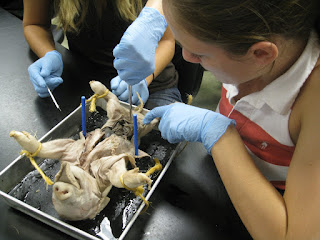Monday, June 15, 2009
Sunday, June 14, 2009
Lab 4 Quiz Bank questions
- How are petroleum deposits formed from the bodies of photosynthetic organisms?
- How is nylon made from petroleum products?
- Is there anything man-made that does not depend on the products of photosynthesis for its production? What on earth (man-made or otherwise) does not depend on photosynthesis?
- Why do some plants have red leaves, and what purpose is this hypothesized to serve?
- How did the FIRST photosynthetic organism come into existence?
- Has the process of photosynthesis evolved over time? How?
- How does red tide occur, and what about these organisms makes red tide toxic to people?
- Can you differentiate among plants based on only their chloroplasts?
- How does uv light affect photosynthesis? Are there plants that can use uv light for the light reactions of photosynthesis?
- Do pesticides affect reaction rates (specifically of photosynthesis)?
Sunday, June 7, 2009
Saturday, June 6, 2009
Lab 3 Quiz Bank Questions
- How does diabetes causes blindness? Is it reversible?
- What spinal reflexes can a person have after death? How is this possible? When do these reflexes stop working?
- Do people with lighter colored eyes have more red-eye in pictures?
- What is astigmatism? How do treatments for it work?
- How do the scuba masks with pink lenses work to make you see more colors?
- What limits the frequencies of sound that people can hear? How is this different than other animals? How does the structure of the ear differ among types of animals?
- Can you improve your reflexes?
- Are Q-tips bad to use in your ears? Why?
- Can cats really see in the dark? How? How are cats’ eyes different than peoples eyes?
- Does uv light (from the sun or a tanning bed) damage the eye?
Thursday, May 28, 2009
Lab 2 Quiz Bank Questions
Answer up to two questions to have reserve credit for the quizzes later in the semester. To get credit, write your answer in a paragraph IN YOUR OWN WORDS. You MUST CITE RELIABLE REFERENCES! You may add to existing comments with new information for credit, but once someone has answered (with properly cited sources), you won't get credit for repeating the information. Participation in the quiz bank questions is optional.
Please feel free to add comments & discussion to any question at any time, even if you are not answering the questions for credit. Sign your posts with your first name and last initial.
1. Why do fetal pigs have teeth? How does pig dental development (and number/type of teeth) differ from humans? (also – what about those hollow un-erupted teeth in the fetal pig? Is this what human teeth look like before they break through the gum?)
2. Do fetal pigs have an “appendix”? Why or why not?
3. What is the purpose of the soft tissue on the hooves of the fetal pig? What happens to this tissue when the pigs are born?
4. What is the stomach of the fetal pig? How does the fetal pig get food? What does the liver do in the fetal pig?
5. Pigs don’t have clavicles. Did they lose them in evolution, or did clavicles develop in other lineages of mammals? Explain the development / loss of the clavicle through evolutionary lineages.
6. Can you live without your pancreas?
7. Why are there so many large taste buds on the sides of the fetal pigs tongue?
8. How does the “morning after” pill work? Is it the same as the ‘progestin minipill’?
9. Why can some women have an orgasm and others can not? Does this have to do with the development or protrusion of the citreous? Is it true that some women can not have an orgasm at all?
10. Is there a genetic basis for homosexuality? Can homosexuality be derived from social experience?
11. Does whether or not a woman has an orgasm during intercourse affect her chances of getting pregnant?
12. How long can sperm survive inside a human body?
Lab 2 Anatomy powerpoint
Saturday, May 23, 2009
Friday, May 22, 2009
Quiz Bank Questions 1
Answer up to two questions to have reserve credit for the quizzes later in the semester. To get credit, write your answer in a paragraph IN YOUR OWN WORDS. You MUST CITE RELIABLE REFERENCES! You may add to existing comments with new information for credit, but once someone has answered (with properly cited sources), you won't get credit for repeating the information. Participation in the quiz bank questions is optional.
Please feel free to add comments & discussion to any question at any time, even if you are not answering the questions for credit. Sign your posts with your first name and last initial.
1. What are the round patches of skin on the side of the iguana’s head? What are their function? How do they relate to sensory organs in other animals and evolutionary development of homologous structures?
2. Did bones evolve from cartilage? How did bones develop?
3. Are tadpoles born with lungs? When and how do lungs develop? Is it related to what happens with the gills? (note: salamanders have tadpole stages too)
5. Brittle stars – What are their natural predators? How can they exist in such large populations without being eaten? Do they have a special type of defense?
6. What do scientists know about the adhesive of the starfish (or other animals with tube
feet that have adhesive)? Are material engineers studying this?
7. When did claws first evolve? What was their original purpose, and how has it changed with other animals?Lab 1 Vertebrate Evolution Powerpoint
Saturday, May 16, 2009
Welcome!
I will post announcements and photos for our lab section on this blog. You will also be able to download powerpoints and course material from the blog. Its going to be a great semester!
Erica































